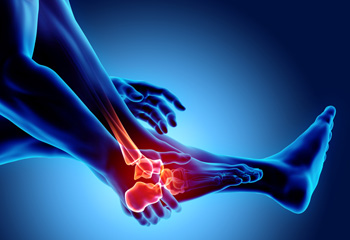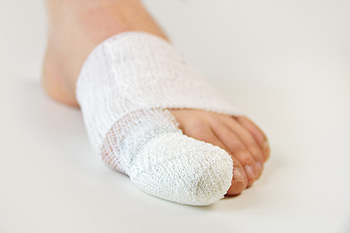Connect With Us
Blog
Items filtered by date: September 2021
What Is Tarsal Coalition?
 Tarsal coalition is a condition in which two of the bones located at the back of the foot become attached to each other due to abnormal growth in the bones themselves, cartilage, or fibrous tissue. The abnormal growth creates a bridge between two bones and leads to foot pain, foot and ankle stiffness, flat feet, muscle spasms, and difficulty walking or limping. Tarsal coalition can be caused by a genetic abnormality, foot trauma, an infection, or arthritis. Most cases are genetic and present from birth, but don’t show symptoms until a child is around 10 years old and the bones have matured. Treatments for tarsal coalition include resting the affected foot, wearing orthotics, a cast, or boot, taking medications to relieve pain, and doing strengthening and stretching exercises. In some cases, surgery may be necessary. If you or your child is experiencing foot pain, please consult with a podiatrist.
Tarsal coalition is a condition in which two of the bones located at the back of the foot become attached to each other due to abnormal growth in the bones themselves, cartilage, or fibrous tissue. The abnormal growth creates a bridge between two bones and leads to foot pain, foot and ankle stiffness, flat feet, muscle spasms, and difficulty walking or limping. Tarsal coalition can be caused by a genetic abnormality, foot trauma, an infection, or arthritis. Most cases are genetic and present from birth, but don’t show symptoms until a child is around 10 years old and the bones have matured. Treatments for tarsal coalition include resting the affected foot, wearing orthotics, a cast, or boot, taking medications to relieve pain, and doing strengthening and stretching exercises. In some cases, surgery may be necessary. If you or your child is experiencing foot pain, please consult with a podiatrist.
Foot Pain
Foot pain can be extremely painful and debilitating. If you have a foot pain, consult with Michael Tomey, DPM from Cary Foot & Ankle Specialists. Our doctor will assess your condition and provide you with quality foot and ankle treatment.
Causes
Foot pain is a very broad condition that could be caused by one or more ailments. The most common include:
- Bunions
- Hammertoes
- Plantar Fasciitis
- Bone Spurs
- Corns
- Tarsal Tunnel Syndrome
- Ingrown Toenails
- Arthritis (such as Gout, Rheumatoid, and Osteoarthritis)
- Flat Feet
- Injury (from stress fractures, broken toe, foot, ankle, Achilles tendon ruptures, and sprains)
- And more
Diagnosis
To figure out the cause of foot pain, podiatrists utilize several different methods. This can range from simple visual inspections and sensation tests to X-rays and MRI scans. Prior medical history, family medical history, and any recent physical traumatic events will all be taken into consideration for a proper diagnosis.
Treatment
Treatment depends upon the cause of the foot pain. Whether it is resting, staying off the foot, or having surgery; podiatrists have a number of treatment options available for foot pain.
If you have any questions, please feel free to contact our office located in Cary, NC . We offer the newest diagnostic and treatment technologies for all your foot care needs.
Why Live with Pain and Numbness in Your Feet?
Why Does My Heel Hurt?
 Heel pain is one of the most common issues treated by podiatrists. While about 7% of adults over the age of 65 experience some form of heel pain, it can affect individuals of all ages. There are many possible causes for heel pain. Plantar fasciitis, an overuse injury of the ligament that runs along the bottom of the foot, is on of the the most common causes. Other reasons heel pain may occur can include an Achilles tendon injury, stress fracture, bursitis, or bruises to the bone and heel pad. Infections, though rare, can also occur in the heel bone, as can various nerve disorders. Heel pain can be associated with systemic diseases, such as diabetes or arthritis. Regardless of the cause of your heel pain, a podiatrist can diagnose the problem and find the right treatment for you. If you are experiencing heel pain, please seek the care of a podiatrist.
Heel pain is one of the most common issues treated by podiatrists. While about 7% of adults over the age of 65 experience some form of heel pain, it can affect individuals of all ages. There are many possible causes for heel pain. Plantar fasciitis, an overuse injury of the ligament that runs along the bottom of the foot, is on of the the most common causes. Other reasons heel pain may occur can include an Achilles tendon injury, stress fracture, bursitis, or bruises to the bone and heel pad. Infections, though rare, can also occur in the heel bone, as can various nerve disorders. Heel pain can be associated with systemic diseases, such as diabetes or arthritis. Regardless of the cause of your heel pain, a podiatrist can diagnose the problem and find the right treatment for you. If you are experiencing heel pain, please seek the care of a podiatrist.
Many people suffer from bouts of heel pain. For more information, contact Michael Tomey, DPM of Cary Foot & Ankle Specialists. Our doctor can provide the care you need to keep you pain-free and on your feet.
Causes of Heel Pain
Heel pain is often associated with plantar fasciitis. The plantar fascia is a band of tissues that extends along the bottom of the foot. A rip or tear in this ligament can cause inflammation of the tissue.
Achilles tendonitis is another cause of heel pain. Inflammation of the Achilles tendon will cause pain from fractures and muscle tearing. Lack of flexibility is also another symptom.
Heel spurs are another cause of pain. When the tissues of the plantar fascia undergo a great deal of stress, it can lead to ligament separation from the heel bone, causing heel spurs.
Why Might Heel Pain Occur?
- Wearing ill-fitting shoes
- Wearing non-supportive shoes
- Weight change
- Excessive running
Treatments
Heel pain should be treated as soon as possible for immediate results. Keeping your feet in a stress-free environment will help. If you suffer from Achilles tendonitis or plantar fasciitis, applying ice will reduce the swelling. Stretching before an exercise like running will help the muscles. Using all these tips will help make heel pain a condition of the past.
If you have any questions please contact our office located in Cary, NC . We offer the newest diagnostic and treatment technologies for all your foot and ankle needs.
Is My Toe Sprained or Is It Broken?
 The symptoms of a mildly broken toe and a sprained toe can be similar. Many toes that are sprained could possibly heal on their own. However, a broken toe generally requires a more proactive healing method. An effective way to accomplish this is by taping the affected toe to the toe next to it. This process is referred to as buddy taping. Symptoms of a broken toe can consist of immediate swelling and bruising, and it can often become difficult to walk and move the affected toe. If you are experiencing signs of a broken toe, it is strongly suggested that you speak with a podiatrist as soon as possible so they can provide you with correct treatment options.
The symptoms of a mildly broken toe and a sprained toe can be similar. Many toes that are sprained could possibly heal on their own. However, a broken toe generally requires a more proactive healing method. An effective way to accomplish this is by taping the affected toe to the toe next to it. This process is referred to as buddy taping. Symptoms of a broken toe can consist of immediate swelling and bruising, and it can often become difficult to walk and move the affected toe. If you are experiencing signs of a broken toe, it is strongly suggested that you speak with a podiatrist as soon as possible so they can provide you with correct treatment options.
A broken toe can be very painful and lead to complications if not properly fixed. If you have any concerns about your feet, contact Michael Tomey, DPM from Cary Foot & Ankle Specialists. Our doctor will treat your foot and ankle needs.
What to Know About a Broken Toe
Although most people try to avoid foot trauma such as banging, stubbing, or dropping heavy objects on their feet, the unfortunate fact is that it is a common occurrence. Given the fact that toes are positioned in front of the feet, they typically sustain the brunt of such trauma. When trauma occurs to a toe, the result can be a painful break (fracture).
Symptoms of a Broken Toe
- Throbbing pain
- Swelling
- Bruising on the skin and toenail
- The inability to move the toe
- Toe appears crooked or disfigured
- Tingling or numbness in the toe
Generally, it is best to stay off of the injured toe with the affected foot elevated.
Severe toe fractures may be treated with a splint, cast, and in some cases, minor surgery. Due to its position and the pressure it endures with daily activity, future complications can occur if the big toe is not properly treated.
If you have any questions please feel free to contact our office located in Cary, NC . We offer the newest diagnostic and treatment technologies for all your foot and ankle needs.
High Heel Side Effects
 High heels may be stylish, but unfortunately they are not ideal for the health of your feet or ankles. Frequently wearing high heels can lead to sore calves, foot pain, weakened ligaments, and deformed toes. These problems are magnified if the shoes are also ill-fitting, too tight, unsupportive, or have a narrow toe box. High heels may also increase your risk of incurring an ankle sprain or falling. Further up in the body, wearing high heels may lead to knee pain, lower back pain, and changes to your posture over time. Even with the risks mentioned, if you don’t want to permanently ban high heels from your shoe closet there are things you can do to lower your chances of foot pain, deformity, and injury. Wear high heels less frequently, choose shoes that fit properly and have a wide low heel, as well as plenty of room in the toe area to wiggle your toes. For more information about the relationship between footwear and proper foot health, please consult with a podiatrist.
High heels may be stylish, but unfortunately they are not ideal for the health of your feet or ankles. Frequently wearing high heels can lead to sore calves, foot pain, weakened ligaments, and deformed toes. These problems are magnified if the shoes are also ill-fitting, too tight, unsupportive, or have a narrow toe box. High heels may also increase your risk of incurring an ankle sprain or falling. Further up in the body, wearing high heels may lead to knee pain, lower back pain, and changes to your posture over time. Even with the risks mentioned, if you don’t want to permanently ban high heels from your shoe closet there are things you can do to lower your chances of foot pain, deformity, and injury. Wear high heels less frequently, choose shoes that fit properly and have a wide low heel, as well as plenty of room in the toe area to wiggle your toes. For more information about the relationship between footwear and proper foot health, please consult with a podiatrist.
High heels have a history of causing foot and ankle problems. If you have any concerns about your feet or ankles, contact Michael Tomey, DPM from Cary Foot & Ankle Specialists. Our doctor can provide the care you need to keep you pain-free and on your feet.
Effects of High Heels on the Feet
High heels are popular shoes among women because of their many styles and societal appeal. Despite this, high heels can still cause many health problems if worn too frequently.
Which Parts of My Body Will Be Affected by High Heels?
- Ankle Joints
- Achilles Tendon – May shorten and stiffen with prolonged wear
- Balls of the Feet
- Knees – Heels cause the knees to bend constantly, creating stress on them
- Back – They decrease the spine’s ability to absorb shock, which may lead to back pain. The vertebrae of the lower back may compress.
What Kinds of Foot Problems Can Develop from Wearing High Heels?
- Corns
- Calluses
- Hammertoe
- Bunions
- Morton’s Neuroma
- Plantar Fasciitis
How Can I Still Wear High Heels and Maintain Foot Health?
If you want to wear high heeled shoes, make sure that you are not wearing them every day, as this will help prevent long term physical problems. Try wearing thicker heels as opposed to stilettos to distribute weight more evenly across the feet. Always make sure you are wearing the proper shoes for the right occasion, such as sneakers for exercising. If you walk to work, try carrying your heels with you and changing into them once you arrive at work. Adding inserts to your heels can help cushion your feet and absorb shock. Full foot inserts or metatarsal pads are available.
If you have any questions please feel free to contact our office located in Cary, NC . We offer the newest diagnostic and treatment technologies for all your foot and ankle needs.

